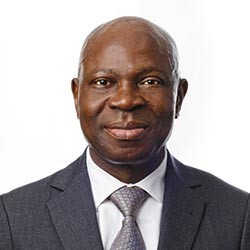Opening Statement by Gilbert F. Houngbo, President of IFAD: Transforming agrifood systems and fostering inclusive rural development to end rural poverty in the context of COVID-19
IFAD Asset Request Portlet
Asset Publisher
Opening Statement by Gilbert F. Houngbo, President of IFAD: Transforming agrifood systems and fostering inclusive rural development to end rural poverty in the context of COVID-19
Views from the United Nations: Investing in the livelihoods of the rural poor for more inclusive agrifood systems
Location: Virtual event
02 December 2020Excellencies,
Ladies and Gentlemen,
Dear colleagues,
We have heard a lot this afternoon from very rich statements and presentations on the impact of COVID-19 and the implications for poverty and food insecurity. We have also heard how this pandemic is setting us back in achieving, or in the prospect of achieving, SDG1 (to end poverty) and SDG2 (to end hunger).
Their words remind us – let's recognize that – it is a responsibility for us, or maybe even our duty, for us to remain united and firm in our commitment to the most marginalized and vulnerable people – especially women, youth and indigenous peoples.
IFAD, as most of you are aware, has been on the front lines of the fight against rural poverty and hunger for more than 40 years. Its mandate has always been very specific: to invest in the poorest of rural communities in order for us to create opportunities, to strengthen food security, and to build resilience.
We want to share some data with you: By the end of 2019, we had a portfolio of US$7.5 billion across more than 200 ongoing projects in over 90 countries, where we are reaching more than 130 million people – half of them women and 20 per cent of them youth.
What is also important to keep in mind is SDG 2.3 – doubling the income of small-scale farmers – and how it is very important for all of us. At IFAD, we are focusing on ensuring that our investments every year improve the incomes of 20 million women and men by increasing their annual income by at least 20 per cent.
Creating agri-food systems that are inclusive and fair to small-scale producers is a very effective way to tackle poverty and hunger.
I know there is little we can do to prevent shocks, but we can mitigate their effects by building resilience and investing in rural economies.
Never has this been more important. Because we know that, when crisis strikes, the poor and vulnerable bear a disproportionate burden – and for the past several months, COVID has been teaching us this once again.
The pandemic has been hard on many of our communities, and just like most of you, we are experiencing significant impacts in the communities IFAD works with. The Ambassador from China, in particular, was really calling upon us for action. I want to talk about the action that IFAD has put in place.
Right from the start, we heard from farmers who could not get seeds or fertilizer for the planting season because borders were closed or travel restricted – and from others who could not harvest their vegetables because there were no farm labourers, or who could not sell because the markets were simply closed.
To help farmers cope and to not have to sell their meagre assets, we quickly repurposed funding, mainly to procure and distribute seeds and fertilizer. So far, we have repurposed about US$150 million, and a further US$50 million is in the pipeline.
In addition to that, we have created the Rural Poor Stimulus Facility to make sure we target those communities that are much more fragile – particularly in lower-income and fragile countries, such as Afghanistan, Lebanon, Somalia, Yemen, etc.
It is also important to point out that, moving forward, we need to integrate a COVID response into our country strategies and into building resilience dimensions, which is also an important point I would like to stress.
Today’s pandemic increases the urgency of making our food systems not only more sustainable, but also more resilient – as well as inclusive and fair.
The youth panelist pointed out there are 500 million small-scale farms in the world. They produce 50 per cent of all food. In parts of Asia and Africa, 80 percent of food production happens on small-scale farms.
So, I cannot insist enough how important it is for us to focus our attention on the small-scale famers if we really want to boot out poverty and make sure we can achieve SDG1 and SDG2 by 2030.
I really want to draw your attention to three points on our collective effort to help small-scale producers:
First is the importance of linking small-scale producers to markets. This means building roads, bridges and market infrastructure – and using digital technologies to facilitate access to information on prices, training and new developments.
Second is strengthening farmers’ organizations so they can negotiate more effectively, promote more transparent pricing, and encourage fair and transparent partnerships between producers and the private sector.
Third – and perhaps the most important from IFAD's perspective – is that governments and the private sector can support increased demand by helping consumers identify products that are produced sustainably and that reward farmers fairly. This is going to be critical if we want to help them increase their incomes.
Before concluding, I would like to take this opportunity to congratulate China on the recent news that it has eradicated extreme poverty. Clearly, this is great news, and it tells us that it is possible to create a world without poverty and hunger.
